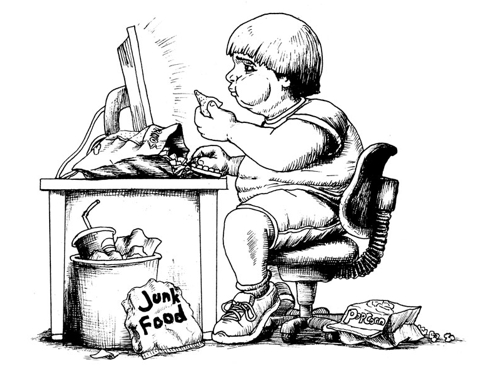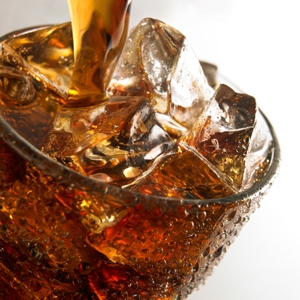A new joint study by McMaster University in Canada and California State University has revealed that increased use of electronic devices – from TVs to Smart Phones – is strongly linked to increased consumption of Sugary and Caffeinated drinks in teens. But computer gaming is not…
 Streaming: Video content pours into the mind and junk food into the stomach.
Streaming: Video content pours into the mind and junk food into the stomach.
What they did
A simple survey of Adolescents and teens produced data on consumption of Sugar-sweetened and Caffeinated beverages and use of electronic devices.
What they found
The study found that more than 27 percent of teens exceed recommended sugar intake and 21 percent exceed recommended caffeine from Soda and energy drinks. Males consumed more Soft Drinks / Sodas and energy drinks than females, and youth in Grade 8 consumed more than those in Grade 10.
“There is a trend towards reduced energy drink and soda consumption [overall] between 2013 and 2016, which is our latest data, but greater electronic device use, particularly TV, is linked to more consumption of added sugar and caffeine among adolescents,” said Dr. Katherine Morrison, who led the research.
An additional hour per day of TV [over and above an agreed baseline] was linked to a 32 per cent higher risk of exceeding World Health Organization (WHO) recommendations for sugar. Each hour more per day of TV was also linked to a 28 per cent increased risk of exceeding WHO caffeine recommendations.
But no link to computer / video games
The researchers were surprised to find video game use was only weakly linked to increased caffeine consumption.
“Given the marketing campaigns that target video gamers, we expected a particularly strong association between caffeine intake from energy drinks or sodas with video game use, but TV was linked more strongly,” Morrison observed.
The takeaway
Both Sugar-sweetened and artificially sweetened Drinks are linked to obesity, diabetes, dental cavities and poor sleep. Excess Caffeine, as found in energy drinks, is associated with headaches, higher blood pressure, nausea, vomiting, diarrhea, and chest pain as well as poor sleep. Consequently, both the American Academy of Pediatrics and the Canadian Pediatric Society urge physicians to educate youth and families about the risks, and to recommend against consumption of these Drinks.
My take
It just makes sense to limit excess Caffeine and Sugar intake – especially among young kids who are still growing and developing. And forming habits for later life. Everybody already knows the hypnotic effect TV can have on people of all ages, and how idle hands often reach for Snacks and Beverages. I mean, I can remember when I was just a little kid back in the 1950s, there was actually a brand of Popcorn in kit form that you could make in the time it cook for a commercial break. It was called – appropriately enough – TV Time. So the TV connection isn’t news.
By the same token, I can see the use of other devices as analogous to TV use in this context. But I’m surprised to hear that the researchers were surprised not to find a similar link between Sugary and Caffeinated Beverages and video gaming. It’s obvious! Using most other devices are relatlively passive activities. TV, where you just sit there and watch, is especially passive, which corresponds to the researchers’ findings that TV watching produced the highest amount of excess Sugar and Caffeine consumption. But when video gaming, the user’s hands – in fact, their whole mental and motor skills systems – are intensely engaged in the act of playing. That’s possibly the apex of ‘active device use’. Who’s got time to reach for a Red Bull when they’re on the verge of completing level 47 and claiming another chest of Gold?
Overall, I agree with the researchers that increased awareness of the issue among parents and kids is an obvious way to start combating the problem.
~ Maggie J.

